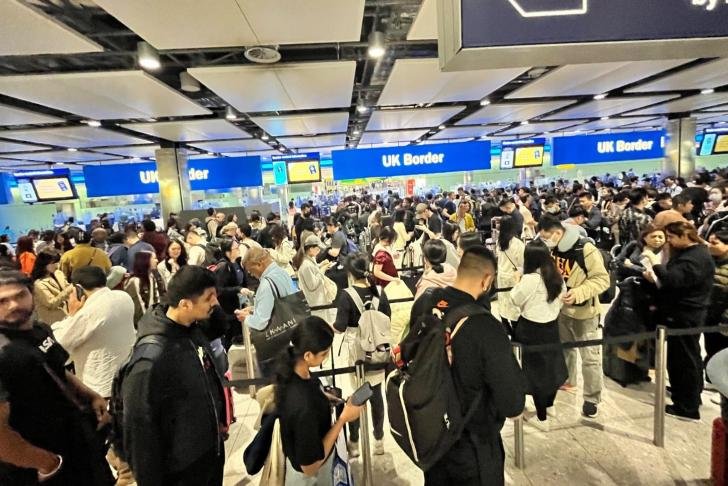The e-gate technology malfunctioned on Tuesday night, leaving thousands of travelers stuck at the major airports in the United Kingdom.
When a countrywide malfunction in the technology occurred, travelers returning from prolonged Bank holiday getaways faced two-hour waits at Heathrow, Gatwick, and Manchester airports.
It is the second time the e-gates have failed in two weeks, raising questions over the reliability of the system which is designed to speed up passengers through passport checks.
There was no evidence to link the border chaos to a cyber attack, but it came just a day after the armed forces payroll system was hacked by a suspected “state actor”.
The gates are understood to have failed at 8pm on Tuesday night just as thousands of passengers landed on early evening planes.
A Home Office spokesman said the e-gates were restored four hours later, shortly after midnight.
“As soon as engineers detected a wider system network issue at 7.44pm last night, a large scale contingency response was activated within six minutes,” the spokesman said.
“At no point was border security compromised and there is no indication of malicious cyber activity.
“We apologise to travellers caught up in disruption and thank our partners, including airlines for their co-operation and support.”
The main Border Force security database - called “Border Crossing” which was introduced just under three years ago at a cost of £372 million – appeared to have suffered a complete shutdown.
Thousands of arrivals at Heathrow, the UK’s busiest airport, were delayed, with passengers waiting in queues for up to two hours. There were also long delays at Stansted, Manchester and Edinburgh airports, and delays of 90 minutes were reported at Gatwick.
Passenger Nathan Lane posted on X: “The entire Egate immigration system at Heathrow Airport is down at all terminals. Now all the systems at the desks are too. Brits and foreigners alike. Nobody is getting through. This is management yelling updates at everyone.”
Richard Gaisford posted on the social media site: “E-gates down at LHR T3, and seemingly across Heathrow Airport. Border Force suggests to passengers it might be a nationwide outage.”
Justin Bronk, a senior research fellow at the Royal United Services Institute (RUSI) in London, who was among those queuing at Heathrow, said: “You see how high-capacity the system normally is by how rapidly things turn to chaos when it breaks; plane after plane of people pouring in and backing up in the corridor.”
There were indications that planes may have been delayed and stacked up in the air to prevent increasing the pressure on queues of passengers waiting to have their documents manually processed by Border Force officers.
Dominic Baliszewski, co-founder of a PR company, said: “Apparently Heathrow isn’t letting planes land and doesn’t have a real plan. E-gates down and they’re processing everyone manually through one gate. This is only a small portion of the queue. Almost no staff on hand.”
At Bournemouth airport, Border Force staff were reported to have resorted to laptops to process passports. Richard Heading, a passenger, reported on X: “All systems are down and they are using laptops to check passports. There are moderate delays.”
A spokesman for Heathrow airport said: “Border Force is currently experiencing a nationwide issue which is impacting passengers being processed through the border.
“Our teams are supporting [them] with their contingency plans to help resolve the problem as quickly as possible and are on hand to provide passenger welfare. We apologise for any impact this is having to passenger journeys.”
There are more than 270 e-gates in place at 15 airports and train stations in the UK that were all understood to have failed. The cause of the issue was unclear. The Home Office apologised last month following the failure on April 25, which it blamed on a “technical issue”.
E-gates usually process the vast majority of passengers, including children aged ten and over, arriving in the UK. They were originally restricted to British and EU arrivals.
However, their use has been extended over the years to include arrivals from Australia, Canada, Iceland, Japan, Liechtenstein, New Zealand, Norway, Singapore, South Korea, Switzerland and the US.








.svg)



